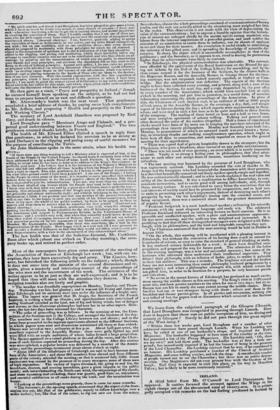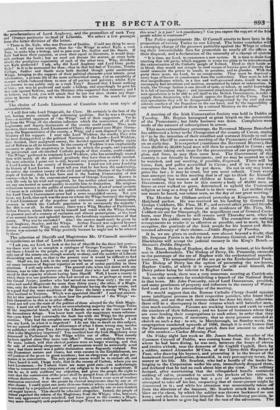IRELAND.
A third letter from Mr. O'Connell to Lord Duncannon, has appeared. It curries forward the account against the Whigs to the eighth charge out of the threatened total of twenty-one. It is princi- pally occupied srith remarks on the bad feeling produced ia Ireland by the proclamations of Lord Anglesey, and the prouiolion of rank Tory and Orange partisans instead of Liberals. We select a few passages from the latter division of the letter.
" There is Dr. Kyle, who was Provost of Dublin. Could any thing be more unfair, I will say more unjust, than for the Whigs' to select Kyle, a rank Tory, to make him a bishop, and to pass over Dr. Sadlier and Dr. Sands. if
Kyle had been their superior, or even their equal in literature, it would dimi- nish perhaps the fault ; but we need not discuss the matter, as every body admits the prodigious superiority of each of the other two. Why, therefore, was Kyle preferred? I ask, why did Lord Anglesey and Lord Grey prefer Kyle? is it to be accounted for thus—that in that hot-bed of Toryism, Trinity
College, Sadlier and Sands were both decided though quite unobtrusive Whigs, bringing to the support of their political character great talents, great information, a private life of the most unblemished stamp, a ad an amiability of
manner which endeared them to men of all parties and politics; whilst Kyle was known to the public only as a rank Tory ? Beyond that I know nothing of him ; yet was he preferred and made a bishop, and accordingly he gave his first vote against Reform, and the Ministry who supported that measure ; and I do believe, my Lord, you will admit that he has not since shown any dispo• sition to favour the party to whom he owes his mitre. So much for your bishop."
The choice of Lords Lieutenant of Counties is the next topic of animadversion.
" I will first take Lord Fitzgerald, for Clare. He certainly is the best of the bad, having many amiable and redeeming qualities. But Ile was a thorough
Tory—a decided opponent of ' the Whigs' and of their supporters. Yet be got from the Whigs all the election influence which the nomination of all the magistrates and deputy-lieutenants of the county could confer. They made this man, their enemy, Lord-Lieutenant of Clare ; they passed over Major lama- mars, the Representative of the county, a Whig, and a man disposed to give the Ministry all his support. I next take Lord Wicklow, the worthy Peer who has been distinguished as the political Narcissus of the Lords—Lord Wicklow, their decided, their malignant enemy, the decided opponent of Popular rights and of Reform in all its branches. In the county of Wicklow it was emphatically necessary to place the magistracy in hands in which the people, and especially the persecuted and oft-insulted Catholic people of that county, could confide. ' The Whigs' preferred to nominate Lord Wicklow, who has accordingly treated them with nearly all the political gratitude they have thus so richly merited. The next selection I point out is still, beyond any comparison, worse: it is that of Lord Lorton for the county of Roscommon. I need not telt your Lordship the history of Lord Lorton. I must tell you that he has been the undeviating, the active, the virulent enemy of the civil and religious liberties of the Catholic people of Ireland ; that he has been and is the leading Conservatist of this
tountry—that he is the concentrated essence of Orange-Toryism. Known in
early life only by his trial and acquittal, he has neither talent nor information, nor any one mental or moral quality to entitle him to distinction. His religious enthusiasm favours to the public of unmixed fanaticism, if not of actual insanity —1 mean as it exhibits itself in his public conduct. I believe you will admit that Lord Grey's Government never had a more unqualified enemy. Yet you
know, my Lord, that such was the man on whom the Whigs bestowed the dignity
of Lord-Lieutenant of the populous and extensive county of Roscommon, a county in which the Catholic population is so enormously the majority ! But this is not all. In that county there was a Whig Member of Parliament, Arthur French, whose father and he himself had voted with the Whigs during the greatest part of a century of exclusion and almost proscription, at the head of an ancient family and splendid fortune, the hereditary representatives of that county. Why was he excluded ? Alas ! the answer could easily be given by Lord Anglesey, Stanley, and the Whigs. Arthur French was rejected because he was a consistent Whig, and steady friend of the Irish people; and Lord Lorton was selected by the Whigs precisely because lie ought not to be selected by them."
The selection of Sheriffs and Magistrates Mr. O'Connell considers as injudicious as that of Lords Lieutenant.
" I ask you, my Lord, to look at the list of Sheriffs for the three last years— was there ever yet so complete a catalogue of Orange-Toryism ? With here
and there a friend to the people, as if got in by chance, perhaps you may find eight out of the ninety-six; though scarcely so many, and the number of Liberals diminishing each year, so that in the present year it would be difficult to find any. Shall we, my Lord, in the next year be better treated ? I could point not many instances of flagrant injustice as well as of undue partiality in these selections. I will only select one. The general rule, when laid down with any fairness, was to take the person on the Grand Jury who had most frequently
served in that capacity without having been Sheriff. Well, I know a county in which there was one gentleman who had served on two, or perhaps as many as
four Grand Juries ; another who had served on more than sixty; the one an active and useful Magistrate for more than thirty years ; the other, if a Magis- trate, only for three or four ; the elder Magistrate having the larger estate, and by a good deal the more wealthier of the two ; the latter a strong Whig ; the other inclined to Toryism. Which was appointed Sheriff? I need not answer. But let this specimen suffice to show how the preferences of the Whigs' ex- hibit themselves in this as in other offices.
1 need not tell you the state of the politics of those selected for the Irish Magis- tracy. I need not tell you by what an overwhelming majority the Orange-Tories
511 the magisterial bench, whilst the Liberals are seen as the rani names of
the Ascendancy deluge. You know how much the magistracy wants reforma. tion—you know how universally the fault lies with the Whigs for the present selection. They had the complete new casting of the magisterial bench. I ask you, my Lord, in what it is improved? I do not like to dwell on this subject, lest my natural indignation and abhorrence of what I deem wrong may involve
my publisher with your Tory Attorney-General ; but I ask you, my Lord, in what is the Magistracy improved? You recollect how the Irish Magistracy were denounced in Parliament by the Whigs whilst out of office. What remedy has been applied since they came into office? None, save making them worse.
We were, indeed, told that clerical justices were no longer wanting, and that the rule of excluding clergymen of all persuasions would be universally acted
upon ; but there never was a public declaration more flagrantly violated. Not only Protestant rectors and vicars, but even curates in the Establishment, are still justices of the peace in great numbers; but no clergyman of any other per.
suasion is in commission. The only proper course would he to exclude all, and I have heard it said, I hope truly, that in the county of Carlow, where you are Lord-Lieutenant,—for I admit there are some good ones—you undevsatingly
refuse-to recommend any clergyman of any religion to be made a magistrate. If that he so, it only confirms my objection, and gives the people the right to heist that the commission of the peace shall be purged from all clerical members without distinction. I do assure you, my Lord, I know more arts of insolent domination exercised over the people by clinical magistrates than by any or all other classes. I could point out more than one district where a truculent tyranny 'a exercised by a prejudiced and mercenary parson, aided by one or two insolent and stupid laymen. This should be reformed altogether. Indeed, the people of Ireland expected the reform of the Magistracy from the Whii-s ; who, however, have only aggravated every mischief, and have given to the country a Magis- tracy more thoroughly anti-popular and Orange-Tory than it ever was befure. Is this wise? is it just ? is it conciliatory ? Can you expect the sup' ort of the Ir' people whilst it continues?"
The Police appointments Mr. O'Connell asserts to have been in proportion of twenty Tories to one Liberal. The letter concludes wit a sweeping charge of the grossest partiality against the Whigs in select ing their irreconcilable foes for promotion to nearly all the offices their disposal, and a declaration of the necessity of a change of syste " It is time, my Lord, to commence a new system. It is time to desist fro courting that vile party, which suggests in terms too plaits to be misundersto the extermination of the Catholic people of Ireland. Dyed as their bands a in blood, they would not scruple to shed oceans of human gore if thereby the could reassume the power to insult, to peculate, and to plunder. With the party there must, any Lord, be no compromise. They must be deprived every hope of favour or countenance from the authorities. They must be left t insignificance nsignificance which, in a free and well-governed state, would be sure accompany bad intentions and motives' unsustained by talent or information. I truth, the Orange faction is one devoid of taste, or-talent, or useful koowledg It is full of truculent bigot' y and interested attachment to despotism. Its pr sent speculation is to be able to sell itself to the British Government, in order t supply State Janissaries, who should oppose the Repeal of the Union. But i this speculation they will be disappointed—disappointed by the cool and con siderate conduct of the Repealers on the one hand, and by the impossibility any reliance being placed on them by a rational Ministry un the other."





















 Previous page
Previous page